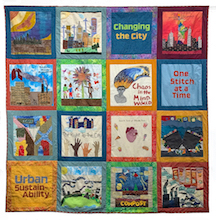
LIU Brooklyn Campus-Community Urban Sustainability Program (CUSP) - Urban Sustainability Quilt, 2022

Compost
Files
Download In Author's Own Words (1.8 MB)
Description
In 2019, an estimated 35% of all food was lost or wasted in the U.S. In 2015, the EPA announced a goal to cut food waste in half by 2030. Organic waste in landfills generates methane, a greenhouse gas far more potent than CO2 and one of the major contributors to global warming. Composting significantly cuts the amount of food that goes into our landfills, reducing the climate and environmental impacts associated with food waste.
Compost has many benefits. It enhances soil and reduces or eliminates the need for chemical fertilizers. Compost enhances water retention in soil, providing carbon sequestration. Composting locally conserves energy and reduces emissions from truck transport. As an active member of my local community garden, my hope is that we all do everything we can to work towards a more sustainable community and planet.
Publication Date
Spring 2022
Disciplines
Art and Design | Urban Studies and Planning
Recommended Citation
Emerson, Margaret Marcy, "Compost" (2022). LIU Brooklyn Campus-Community Urban Sustainability Program (CUSP) - Urban Sustainability Quilt, 2022. 12.
https://digitalcommons.liu.edu/cusp_usquilt_2022/12

